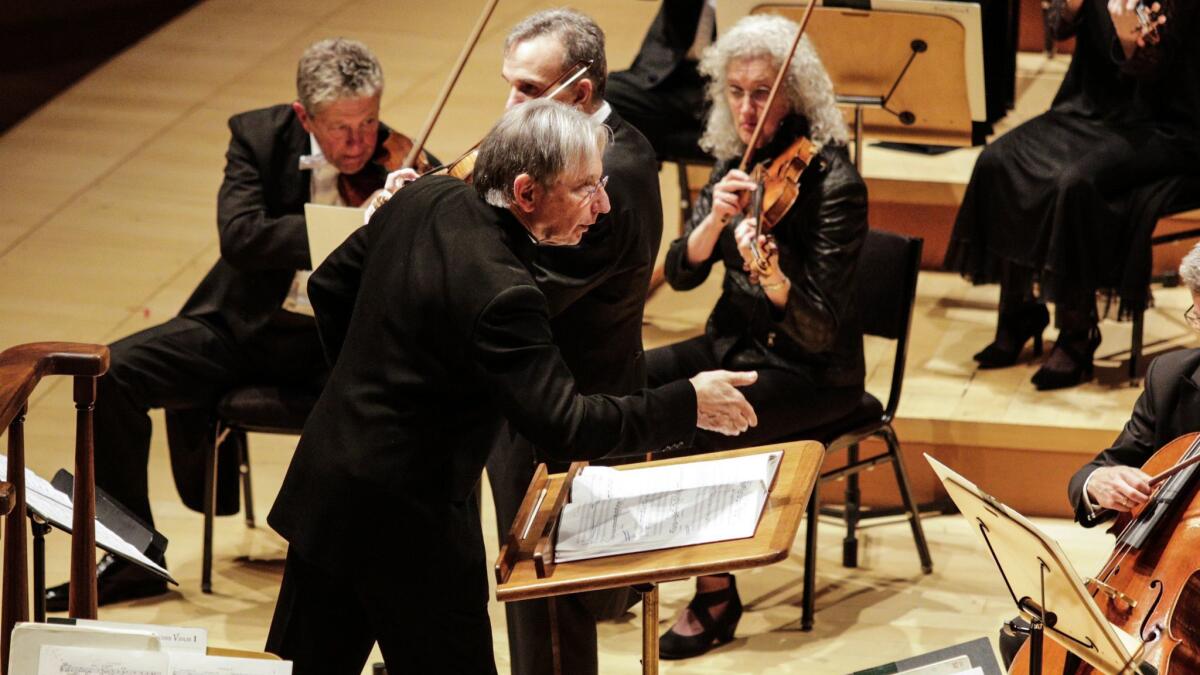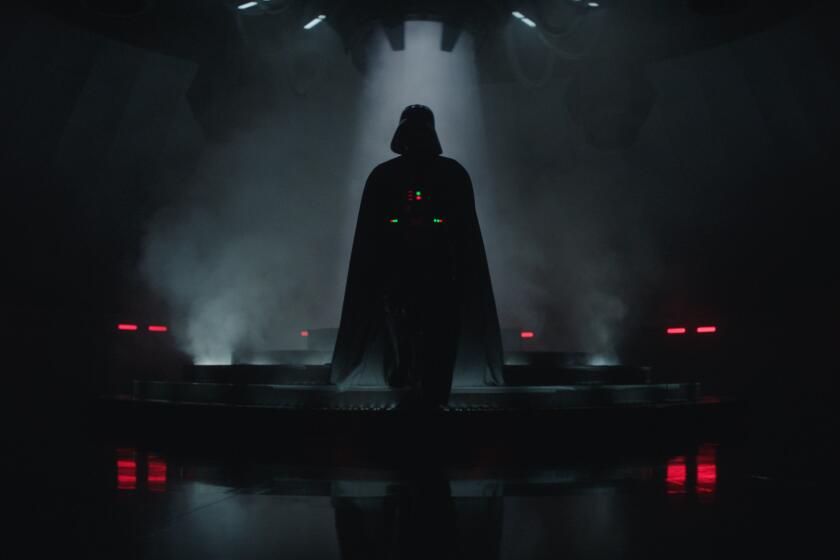Review: Michael Tilson Thomas brings his ‘Playthings’ to the L.A. Phil, and they’re not what you think

- Share via
“The past is a bucket of ashes,” so begins, italics and all, Michael Tilson Thomas’ “Four Preludes on Playthings of the Wind.”
What a way to blow into town to begin his two-week contribution to the Los Angeles Philharmonic centennial celebration at Walt Disney Concert Hall. What a way, indeed, for his compelling L.A.-infused song cycle to Carl Sandburg’s cautionary poems reaching Los Angeles for the first time last weekend, followed by a fascinating performance of Tchaikovsky’s “Pathetique” Symphony.
MTT, as we all know him, is, of course, the L.A. born and bred conductor who is the most complete product of the city’s unique musical soil. His musical training here brought him into contact with Stravinsky, the world of Schoenberg, Copland, Boulez, Heifetz, Piatigorsky, Hollywood, South Central jazz, rhythm and blues, Sunset Boulevard pop music and cheesy and not-so-cheesy local a.m. radio. His history with the L.A. Phil is livelong, including a stint as a principal guest conductor in the 1980s.
He has always composed. If you can get him to sit down at a piano during a party (not too difficult, I’m told), he is likely to improvise a dazzlingly topical song. But turning that party trick into major compositions is another matter.
And that is exactly what Tilson Thomas has done with “Playthings.” The origins are a party at Venice Beach in 1976, his wry reminder that the party really will soon be over. This was the year of the American Bicentennial, and Sandburg’s four short 1922 poems contemplate the fate of “the greatest nation, nothing like us ever was,” being just like our own fates, dust where “even the writing of the rat footprints tells us nothing, nothing at all.”
Completed 40 years later, “Playthings” was given its premiere by Tilson Thomas with his Miami Beach training orchestra, the New World Symphony. A performance shortly afterward with the San Francisco Symphony, where Tilson Thomas has been music director for two decades, was a stunning occasion. But at the Saturday night L.A. Phil performance, “Playthings,” rather than dowsing the celebratory orchestra season in cold water, came exuberantly home.
Playthings of the wind we may all be, but that’s all the more reason to live it up while we can, and Tilson Thomas lives it up big time. He employs the versatile and theatrical soprano Measha Brueggergosman and two backup singers, all three strutting their stuff in matching silver sequined gowns, a smallish regular orchestra with a wild percussion section, a lavish bar band. You could spend the half hour the songs last counting the different musical influences — Sarah Vaughan, John McLaughlin, Bernstein, Berg, Gershwin, Ellington, doo-wop, bebop and on and on.
In an era of uninhibited eclecticism, this kind of thing might seem a next to normal plaything. But these “Playthings” never leave the impression of a clever combining of different styles and genres. A belting baritone sax, a psychedelic electric guitar, the recorded sound of a cash register, flamboyant percussion, Brueggergosman’s singing — sultry, joyous or gloomy — all provide just the right reactions to Sandburg, word for word, sentiment for sentiment, prophecy for prophecy.
Crows caw, lizards listen, golden girls sing and the feet of rats scribble on the doorsills sounding not maybe as you would expect, but in hearing them, discovering that they sound as they must. The music first entrances, then sinks in.
Tchaikovsky’s Sixth Symphony (“Pathétique”) did not follow to make us feel hopeful after intermission. It was the composer’s last work, probably his best, and it is heard these days, with its slow movement Finale, as a farewell. Tilson Thomas has released an excellent recent recording of it with his San Francisco Symphony, but in many ways, this too, in his hands, becomes an L.A. symphony. That proved particularly evident when played with the grace, sophistication and flamboyance of the L.A. Phil. In the context of the conductor’s own piece, the “Pathétique” becomes another playground for the wind.
Tilson Thomas brings a nostalgic wistfulness to the symphony. His Tchaikovsky of the Technicolored melancholy of an old Hollywood tearjerker. A Talmudic Tchaikovsky, questioning every gesture, but always with the knowing reserve that sadness and beauty are the way of the world. A Tantric Tchaikovsky, cyclically doling out pleasure and suffering. And finally, a Thomashevsky Tchaikovsky, as earthily expressive as the Yiddish theater of MTT’s grandparents, until that burst of distress in the Finale, releasing a wealth of pent-up wrath before grudgingly opening the door for fate.
The L.A. Phil has played the “Pathétique” in many, many different ways. It recorded it thrilling with Zubin Mehta and with a fervor of a Verdi opera under Carlo Maria Giulini. Gustavo Dudamel goes in for boldness. Tilson Thomas is less of the moment than of moments, past and present. His vision is wide. The L.A. Phil responded as though an idealized extension of the conductor. It was an extraordinary performance.
More to Read
The biggest entertainment stories
Get our big stories about Hollywood, film, television, music, arts, culture and more right in your inbox as soon as they publish.
You may occasionally receive promotional content from the Los Angeles Times.











